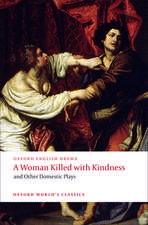Moral Play and Counterpublic: Routledge Studies in Renaissance Literature and Culture
Autor Ineke Murakamien Limba Engleză Hardback – 7 feb 2011
| Toate formatele și edițiile | Preț | Express |
|---|---|---|
| Paperback (1) | 386.81 lei 6-8 săpt. | |
| Taylor & Francis – 10 dec 2019 | 386.81 lei 6-8 săpt. | |
| Hardback (1) | 1107.46 lei 6-8 săpt. | |
| Taylor & Francis – 7 feb 2011 | 1107.46 lei 6-8 săpt. |
Din seria Routledge Studies in Renaissance Literature and Culture
-
 Preț: 311.41 lei
Preț: 311.41 lei -
 Preț: 714.61 lei
Preț: 714.61 lei -
 Preț: 295.35 lei
Preț: 295.35 lei -
 Preț: 481.86 lei
Preț: 481.86 lei -
 Preț: 339.87 lei
Preț: 339.87 lei -
 Preț: 449.79 lei
Preț: 449.79 lei - 18%
 Preț: 1045.39 lei
Preț: 1045.39 lei -
 Preț: 440.40 lei
Preț: 440.40 lei - 18%
 Preț: 994.52 lei
Preț: 994.52 lei - 18%
 Preț: 1102.58 lei
Preț: 1102.58 lei -
 Preț: 280.88 lei
Preț: 280.88 lei - 18%
 Preț: 1101.00 lei
Preț: 1101.00 lei - 18%
 Preț: 1045.39 lei
Preț: 1045.39 lei -
 Preț: 386.54 lei
Preț: 386.54 lei - 26%
 Preț: 763.78 lei
Preț: 763.78 lei -
 Preț: 437.54 lei
Preț: 437.54 lei - 26%
 Preț: 764.62 lei
Preț: 764.62 lei - 13%
 Preț: 321.08 lei
Preț: 321.08 lei - 26%
 Preț: 765.01 lei
Preț: 765.01 lei -
 Preț: 430.09 lei
Preț: 430.09 lei - 18%
 Preț: 1054.43 lei
Preț: 1054.43 lei - 18%
 Preț: 1098.65 lei
Preț: 1098.65 lei - 18%
 Preț: 1049.30 lei
Preț: 1049.30 lei - 18%
 Preț: 1053.41 lei
Preț: 1053.41 lei - 18%
 Preț: 1130.23 lei
Preț: 1130.23 lei -
 Preț: 384.65 lei
Preț: 384.65 lei - 18%
 Preț: 1046.15 lei
Preț: 1046.15 lei -
 Preț: 490.18 lei
Preț: 490.18 lei - 26%
 Preț: 762.57 lei
Preț: 762.57 lei -
 Preț: 413.18 lei
Preț: 413.18 lei - 18%
 Preț: 1103.35 lei
Preț: 1103.35 lei - 18%
 Preț: 1032.69 lei
Preț: 1032.69 lei - 18%
 Preț: 992.90 lei
Preț: 992.90 lei - 26%
 Preț: 847.73 lei
Preț: 847.73 lei - 26%
 Preț: 849.48 lei
Preț: 849.48 lei - 18%
 Preț: 1047.74 lei
Preț: 1047.74 lei - 18%
 Preț: 1042.36 lei
Preț: 1042.36 lei - 26%
 Preț: 765.77 lei
Preț: 765.77 lei
Preț: 1107.46 lei
Preț vechi: 1350.55 lei
-18% Nou
Puncte Express: 1661
Preț estimativ în valută:
212.10€ • 218.52$ • 177.67£
212.10€ • 218.52$ • 177.67£
Carte tipărită la comandă
Livrare economică 22 februarie-08 martie
Preluare comenzi: 021 569.72.76
Specificații
ISBN-13: 9780415886314
ISBN-10: 0415886317
Pagini: 272
Dimensiuni: 152 x 229 x 16 mm
Greutate: 0.64 kg
Ediția:1
Editura: Taylor & Francis
Colecția Routledge
Seria Routledge Studies in Renaissance Literature and Culture
Locul publicării:Oxford, United Kingdom
ISBN-10: 0415886317
Pagini: 272
Dimensiuni: 152 x 229 x 16 mm
Greutate: 0.64 kg
Ediția:1
Editura: Taylor & Francis
Colecția Routledge
Seria Routledge Studies in Renaissance Literature and Culture
Locul publicării:Oxford, United Kingdom
Public țintă
Postgraduate and UndergraduateCuprins
Introduction: "Public, Scurrilous, and Profane": Moral Drama 1465-1599. Chapter 1: Mankind: Publicizing the New Guise Chapter 2: William Wager: Monstrous Ambition and the Public Weal Chapter 3: History as Allegory: Chronicle Plays and the Bid for Public Office Chapter 4: Rhetorical Revolt: Marlowe’s Theater of the Public Enemy Chapter 5: Public Judgment and the Virtue of Vice in Jonson’s Sin City Chapter 6: Epilogue: Death Comes to Moral Drama
Recenzii
"There are plenty of nuggets of insight that should be accessible to anyone... Murakami's expansive view of what constitutes moral drama, and the ways in which it could say many different things at once to different segments of its audience is persuasive." - David Kathman, Sixteenth Century Journal
"This intellectually stimulating and densely argued study takes a fresh look at the moral drama tradition. . .a worthy contribution to scholarship on the moral plays and on their legacy, and for Marlowe scholars the discussion of Ramus and Doctor Faustus is must reading." - Paul Whitfield White, Marlowe Society of America Newsletter
"Murakami shows a bold willingness to draw on authors’ biographies and performance conditions when relevant, and succeeds in conveying the social critique embedded in the plays." - Karen Robertson, Renaissance Quarterly
"In addition to providing a new perspective on the English tradition of moral drama, Moral Play and Counterpublic makes a meaningful intervention in the growing body of critical work on early modern public spheres." - Jennifer Rust, Journal of Early Modern Cultural Studies
"This intellectually stimulating and densely argued study takes a fresh look at the moral drama tradition. . .a worthy contribution to scholarship on the moral plays and on their legacy, and for Marlowe scholars the discussion of Ramus and Doctor Faustus is must reading." - Paul Whitfield White, Marlowe Society of America Newsletter
"Murakami shows a bold willingness to draw on authors’ biographies and performance conditions when relevant, and succeeds in conveying the social critique embedded in the plays." - Karen Robertson, Renaissance Quarterly
"In addition to providing a new perspective on the English tradition of moral drama, Moral Play and Counterpublic makes a meaningful intervention in the growing body of critical work on early modern public spheres." - Jennifer Rust, Journal of Early Modern Cultural Studies
Descriere
In this study, Murakami overturns the misconception that popular English morality plays were simple medieval vehicles for disseminating conservative religious doctrine. On the contrary, Murakami finds that moral drama came into its own in the sixteenth century as a method for challenging normative views on ethics, economics, social rank, and political obligation. From its inception in itinerate troupe productions of the late fifteenth century, "moral play" served not as a cloistered form, but as a volatile public forum. This book demonstrates how the genre’s apparently inert conventions—from allegorical characters to the battle between good and evil for Mankind’s soul—veiled critical explorations of topical issues. Through close analysis of plays representing key moments of formal and ideological innovation from 1465 to 1599, Murakami makes a new argument for what is at stake in the much-discussed anxiety around the entwined social practices of professional theater and the emergent capitalist market. Moral play fostered a phenomenon that was ultimately more threatening to ‘the peace’ of the realm than either theater or the notorious market--a political self-consciousness that gave rise to ephemeral, non-elite counterpublics who defined themselves against institutional forms of authority.














